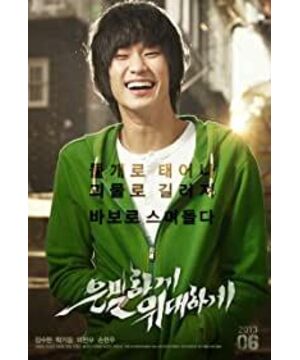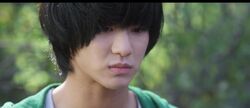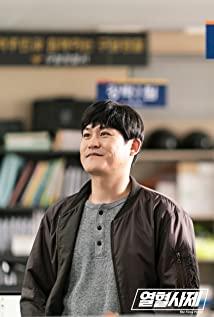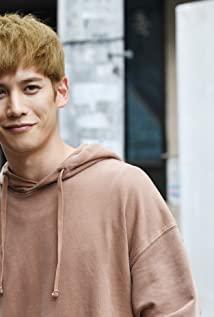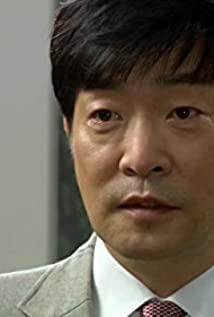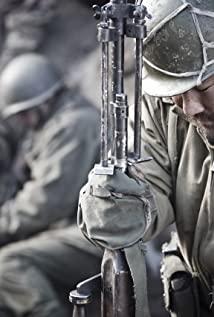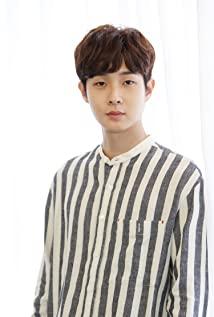The story with the political theme of North and South Korea as the background is not new. I heard that this one is adapted from a very popular comic work. The relatively novel thing is that the setting of a fool as an undercover identity is full of joy, and it is a good gimmick for storytelling. As for the actual effect of this operation in reality, it is unknown. In fact, such a setting itself is full of irony. I am afraid that in the eyes of South Koreans, most North Koreans are not normal people :)
Although there are good gimmicks to tell the story, the story is still a bit unsatisfactory. The wanton humor in the first half and the hero's end in the second half contrast with each other. I think the director wants to show the huge tension, but I don't think this tension is expressed enough, mainly because of the strength of the plot development and the logic of the narrative. It was not enough, so the effect that I wanted to create was not achieved as scheduled. However, Korean directors are accustomed to playing emotional cards. The handling of some small details is always so delicate and moving, earning enough tears from the audience. Coupled with the high-quality performances of the actors and a few finishing lines, they add to the original weak script. a lot of points. So I give a four star rating.
In fact, compared to the first half, I personally prefer the second half of the movie. On the one hand, the first half is insufficient for the huge changes in the hero's heart, and there are more bugs in the logic narrative in this half. For example, the impoverished town near Seoul is inconceivably home to three elites from the republic; for example, what is the mission of the fool Dongjiu that has been lurking for two years? What great political significance can the collection of daily life data of ordinary people in a small town have? ! I can only self-compromise and imagine that these idiotic plots are the idiots of North Koreans in the eyes of South Koreans. Another aspect is that I am a little incapable of accepting the funny aspects of Korean movies (I have seen only a handful of Korean movies), and I always feel a little vulgar, although Kim Soo Hyun plays it very well. For me, who has the habit of watching dramas while eating, it was a huge test when the male protagonist pooped on the street and was bumped into by the girl in his mind who was like his first love. The sister who was sitting on the side was so disgusted at the time that she decided to give up the drama. Fortunately, I persevered, and after about fifty minutes of watching, I felt that the story was starting to get better.
The story is not complicated. Won Yoo-hwan, a spy from North Korea under the cover of a fool Dong-gu, lives a quiet, hidden life in a small village near Seoul. Until one day two spies from the same organization came to the same district. . . Yuan Liuhuan is a very different agent. Apart from trying his best to act crazy and become stupid in his daily life, he is also a big boy with a soft heart. The director did not properly express how he was influenced by the simple life and simple emotions of the South Korean people, and what I saw directly was the result of the influence. (It’s a bit of a pity.) The image of the agent presented in the movie is not so much a fool as a night-time Batman who is happy to help others: like a great detective looking for children lost at night; The girl next door; for the shopkeeper grandma who was bullied by the underworld; to rescue the son of the shopkeeper grandma who was beaten by the wicked. Apart from acting stupid in front of people, he didn't even have a cold expression. The only time he was more cruel was when he first saw the child of Li Haizhen and gave him a fierce knife, and the original intention of that child was just to help him survive the cruel training.
The uneven handwriting on the letterhead was densely filled with love for the mother who stayed in her hometown. The letters that could never be sent, stuffed under the pillow, made people remember how lonely he was living in another strange world where he couldn't see people as they really were. As for his mother, in addition to his belief in the republic, he was a distant, soft and final consolation in his heart.
Some small fragments that I remember very clearly flow through my heart like a warm current:
Dong Jiu, wearing a green sportswear, lay on his back in the warm sunshine, looking at the blue sky and white clouds, and said to the mother in his heart: "Mom, you How are you doing? I'm doing well. I miss my mother smiling so much..."
Dong Jiu was behind the warehouse and asked Lee Hae Jin to rescue the grandmother and son and teach those underworld gangsters a gentle lesson. Lee Hae Jin put on his hat, smiled and said, "Will you help me?
. Silly and innocent smiling face, this harmonious and happy "home" atmosphere is very attractive to him. "I'm very scared, I'm afraid that the food distribution will suddenly be interrupted; I'm afraid that I won't survive during training; I'm afraid of being abandoned by the party. Now, because I may change, I'm afraid." At that moment, the film freezes the most ordinary joys. , but it was Dong Jiu's desire to go so far. And those short moments also remembered the most beautiful moments in the short lives of the three teenagers. . .
Afraid of changing and unable to help but want to get closer, she insists on the struggle between her belief in the party and an ordinary and sincere life. . . With such a contradictory heart, finally, when he received the last inexplicable order from the motherland, "collective suicide", everything was settled.
My only concern is my mother. As long as my mother lives well under the care of the Republic, it doesn't matter how she devotes herself to the country. But the truth is that my mother was already executed as a traitor's mother. The absurdity of politics in the context of a big family and country projects the absurdity of the individual destiny as a self. For us, who share a historical background with North Korea, such absurd fate is sympathetic to us.
When he learned the truth that his mother had been executed long ago, Yuan Liuhuan's personal belief collapsed in an instant, and the spiritual support to survive no longer existed. The sentence "So what is important to the motherland??" expresses the infinite confusion and resentment in his heart after the collapse of his beliefs. But even so, would you betray your own country? The answer is so simple and clear. Just as South Korea asked Won Yoo-hwan to abandon his country when the North's agent leader wanted him to make a choice, Won Yoo-hwan's answer was: "If you are not satisfied with your mother, will you abandon her too? Go away." To
live or to die? In the last scene, Won Yoo Hwan asks himself like Hamlet. When I saw the passbook stuffed in his jacket by the shopkeeper grandma, the small changes in the bank details corresponded to the continuous increase in the amount of deposits: from the salary to Dongjiu, to our salary to Dongjiu, to my second son Money, to the son's wife money. The heavy love is conveyed through simple words, and Yuan Liuhuan, whose life is about to come to an end, rekindles a little bit of hope. . . "I want to go back to that kind of life..."
That kind of life is exactly what their chief instructor couldn't understand until he died: "What is it that made you like this? Shaken by a little bit of emotion?" As everyone knows, life The most moving part is the countless tiny beautiful trivialities. He didn't understand because he never really lived in such a totalitarian country.
However, in Yuan Liuhuan's mind, even if he longed for such a life so much, he could not exchange it for humiliation and surrender. Therefore, falling off a high-rise building holding his brother Haizhen was his last choice. As the rocker Captain Waves said: what's the point of being alive? It's better to live like this than to die graciously.
Lying under a tall building wearing a white shirt, Dongjiu closed his eyes and finally remembered the dialogue when the three teenagers were sitting on the balcony picking up small fish when the spring flowers were blooming:
"Leader, if there is any What kind of person do you want to be in the next life?"
"Me? Born and lived in an ordinary country, an ordinary family."
"What a big dream!"
"What did you say? What do you want to be?"
"I To be born next door to the leader of ordinary people."
"These mortals! I, I am the plump beauties at your front door, I will play with you and then throw them away!"
Death came so peacefully and peacefully. Gently take the three teenagers into that sweet dream about the afterlife. . .
View more about Secretly Greatly reviews


